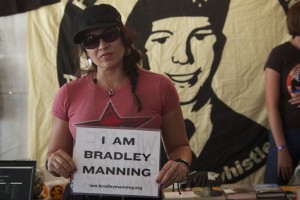Update 8/23/11: Bradley’s case linked to other whistle-blowers, Obama’s anti-WikiLeaks law
Glenn Greenwald has written an article using Bradley Manning as one example in what he sees as a worrying trend -the Obama’s Administrations tendency to put punishment before trial, entitled “A Prime Aim of the Growing Surveillance State.”
In “How Washington lost faith in America’s courts,” Karen Greenberg discusses the rise of executive efforts to bypass traditional judicial process. Bradley’s actions are equated with that of NSA whistleblower Thomas Drake. After the success of his court case, Drake has gathered mostly positive press and has in turn signaled his support for organizations like WikiLeaks.
From wired.co.uk:
According to journalist and campaigner Heather Brooke, we are at a tipping point. “We could have the greatest democracy we have ever seen or equally, we could have the greatest totalitarian state we’ve ever seen,” she tells Wired.co.uk in the lead up to the publication of her book — The Revolution will be Digitised.
Published today (18 August), the book saw Brooke, famous for fiercely pursuing Westminster over the MPs expenses scandal, delving into what she terms the “Information War”. Each chapter follows a different warrior and tells of their involvement. Her subjects include the US Army soldier, Bradley Manning, currently awaiting trial for leaking military documents and Julian Assange, the man behind Wikileaks — where the documents appeared.
Read more here.
David Rovics, the socially conscious indie music writer and performer that Amy Goodman calls ‘the
music version of Democracy Now’, has released a new music video in support of Bradley Manning and
his ongoing trial. The documentary like video, produced by Ritchie Cavander-Cole, tells the story of
Bradley’s heroic decision to release evidence of war crimes, and it includes footage of a number of
protests and footage from the now famous collateral murder video. Video here.
John Glaser, in his post “Obama Crafts New Anti-Wikileaks Law”, at the Anti War Blog, asks “why
craft an executive order specifically with the purpose of preventing the release of government secrets
which have been shown to be safely made public?” Are too many documents unnecessarily classified?
Why hide so much from the public? Haven’t the leaked documents given people a better look at their
own government? More here.
Julian Assange responds to criticisms that a cache of Wikileaks source material had been
destroyed, “WikiLeaks does not record or retain source identifying information, however the claimed
destruction of documents entrusted to WikiLeaks between January 2010 and August 2010 demands the
revelation of inside information so sources can make their own risk assessments.” He goes on to reveal
how an employee of Wikileaks had developed a conflict of interest that demanded his access to source
material be revoked. Interestingly, he refers to David House, of the Free Bradley Manning Support
Network, who acknowledged authorities had tried to bribe him to inform on Wikileaks activities.










